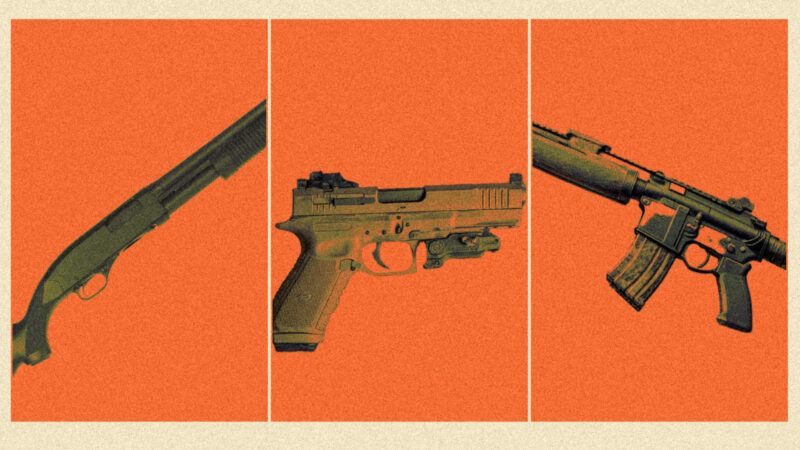Gun Rights Groups Sue To Overturn Federal Weapons Registration
The case argues that, since the One Big Beautiful Bill Act eliminated taxes on the transfer of certain weapons, the constitutional basis for registering those weapons no longer exists.

A squad of Second Amendment rights organizations, including the Second Amendment Foundation, the National Rifle Association, and the Firearms Policy Coalition, along with some private citizen plaintiffs, think that new changes in government taxes on owning certain weapons create a chink in the legal armor of the federal weapon registration regime established in the 1934 National Firearms Act (NFA).
They have thus filed a lawsuit in U.S. District Court for the Eastern District of Missouri against the Bureau of Alcohol, Tobacco, Firearms and Explosives (ATF) and the Justice Department, seeking to end the registration requirements of that act.
Part of the recently passed "One Big Beautiful Bill Act," the suit notes, "eliminated the making and transfer taxes on suppressors, short-barreled rifles, short-barreled shotguns, and NFA-defined 'any other weapons,' while leaving the registration requirements intact. In other words, individuals no longer have to pay taxes for making and transferring most firearms under the NFA, but the firearms are still required to be registered."
There's the rub, the plaintiffs insist. They maintain that the only valid constitutional excuse for the registration was the taxes. Thus, constitutionally, with the taxes gone, the registration requirements also must go away.
As the suit puts it, with the taxes eliminated on items "including suppressors, short-barreled rifles, and short-barreled shotguns," the NFA registration requirement should now be seen as "unconstitutional as applied to those arms."
The Supreme Court, the filing shows, has in the past said outright that the legal defense of those NFA requirements lay in Congress' "enumerated power to 'lay and collect Taxes,'" and has held "that the NFA was 'only a taxing measure' and that the registration provisions were 'obviously supportable as in aid of a revenue purpose.'" (Those citations are from Sonzinsky v. United States [1937]). In 1968's Hayne v. U.S., to boot, the Supreme Court called the NFA "an interrelated statutory system for the taxation of certain classes of firearms."
The suit also points out that the 8th Circuit Court of Appeals has already ruled that the often overly malleable Commerce Clause doesn't support the registration requirements, citing the 1999 case United States v. Hall.
The suit explains why the plaintiffs are aggrieved by existing NFA registration requirements.
[They] value their personal privacy and do not want the federal government to obtain identifying information about their personally owned firearms, including information such as their names, home addresses, photographs, dates of birth, demographic information, fingerprints, and a detailed description of their firearms, including their quantity and physical locations. Federal law, however, currently requires that Individual Plaintiffs provide all of this intrusive personally identifying information to the federal government for them legally to make, transfer, or receive items defined and regulated as "firearms" under the NFA through its registration requirements. Individual Plaintiffs object to this burdensome registration requirement, which forces them to provide information to the federal government similar to that obtained from an individual arrested and charged with a crime.
The suit goes on to complain about the burden imposed by the ATF's lengthy approval process for purchases or transfers of regulated weapons. It details specific actions the individual plaintiffs want to take—such as transferring suppressors and short-barreled rifles—but are refraining from because they find the registration requirements too burdensome.
The suit also notes that one of its plaintiffs, Prime Protection STL Tactical Boutique, "is a Black-owned federally licensed firearms store in St. Louis County with
a primarily Black customer base….Prime Protection is licensed to sell NFA items
under the NFA. Despite being licensed to do so and offering them for sale, however, Prime Protection has not sold any NFA items because customers—and especially members of the Black community—do not wish to comply with the NFA's intrusive requirements."
The One Big Beautiful Bill Act did not eliminate the making or transfer tax on machine guns or "destructive devices" and thus those weapons would not be affected by the outcome of this suit. The suit spends a lot of time arguing that any restrictions on suppressors or short-barreled rifles do not meet the current standard of Second Amendment law as established in New York State Rifle & Pistol Association v. Bruen, since they are not "consistent with this Nation's historical tradition of firearm regulation" and that the objects in question are not "dangerous and unusual."
Most of the action in Second Amendment jurisprudence since 2008, when the Supreme Court established in the Heller case that the Second Amendment at the very least establishes a right to have commonly used weapons for self-defense in the home, has been about laws affecting gun ownership, carrying, and use. This new suit thus opens up a potential new frontier in rolling back laws that place restrictions on would-be weapon owners short of forbidding them to own or carry them.


Show Comments (39)